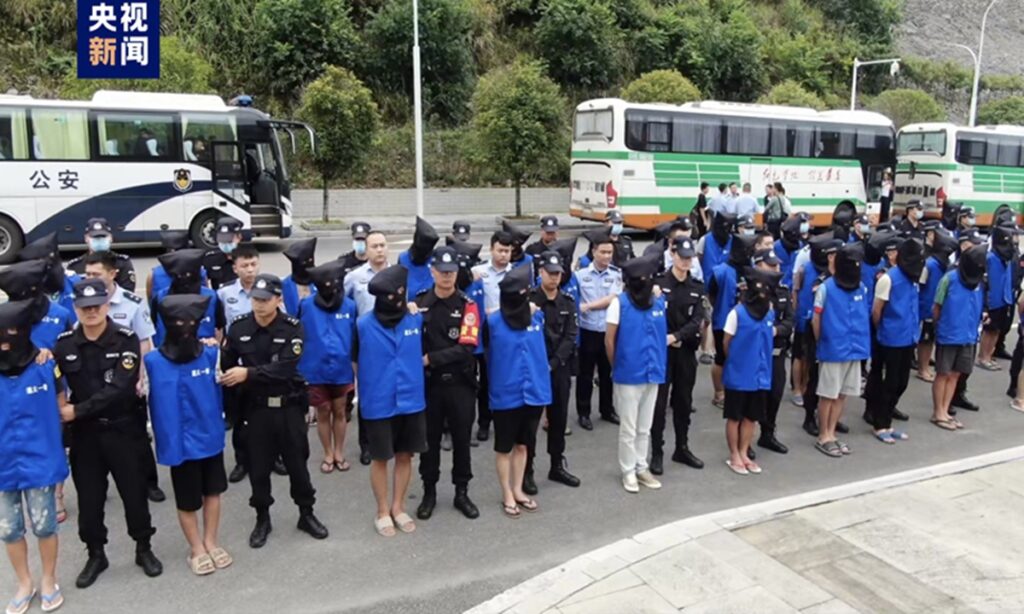Recently, the public security organs in Southwest China’s Yunnan Province and the law enforcement authorities in Myanmar cooperated and successfully captured 307 Chinese criminals suspected of cross-border telecom fraud in the Wa State region of northern Myanmar and handed them over to China. This is another major success in a joint operation between China and Myanmar to combat telecom fraud. Since last year, China and Myanmar have deepened international police cooperation, and more than 50,000 Chinese suspects involved in fraud have been handed over to China. The high incidence of Chinese-related telecom fraud in northern Myanmar has been effectively curbed. Next, the two sides will organize special crackdown operations to resolutely eradicate the “tumor” of telecom fraud in northern Myanmar and effectively safeguard the personal and property safety of the people.
In recent years, with the rapid popularization of the internet and social media, telecom fraud crimes have become more frequent and have become a global governance problem. Especially when cracking down on cross-border telecom fraud crimes, governance is even more difficult due to problems such as limitations on law enforcement powers and difficulty in pursuing suspects. If left uncontrolled, it will not only damage the lives and property of the people, but also worsen the security situation in surrounding areas.
For this reason, China encourages countries in the Global Security Initiative (GSI) to make institutional arrangements to fight transnational crimes, and actively conduct law enforcement cooperation on the basis of respecting each country’s sovereignty, so as to jointly improve law enforcement capacity and security governance.
China has always actively carried out security cooperation with other countries to jointly maintain world peace and tranquility. The GSI has further promoted relevant cooperation. Especially in the Lancang-Mekong region, where security governance issues are more prominent, China has proposed supporting the promotion of cooperation in non-traditional security fields under the Lancang-Mekong Cooperation (LMC) framework, implement relevant cooperation projects under the LMC Special Fund, and strive to foster a pilot zone for GSI. The joint fight against cross-border telecom fraud is a vivid practice of China and Myanmar’s implementation of the GSI. It is also a good example of the two countries taking practical actions to build the Lancang-Mekong region into a GSI pilot zone.
A simple truth is that if we want to live a good life together, we must solve problems and create a favorable environment together. When faced with the problem of governance of cross-border telecom fraud, more and more neighboring countries are seeking cooperation with China. In addition to Myanmar, countries such as Vietnam, Laos, Cambodia, and Thailand are also cooperating with China to combat telecom fraud.
Not long ago, the joint statement issued by China and Vietnam clearly stated that the two sides should promote cooperation in combating telecom fraud and other fields. Prior to this, the foreign ministers of China, Laos, Myanmar, and Thailand held an informal meeting. They all agreed to intensify efforts to jointly combat cross-border crimes such as online gambling and telecom fraud.
This shows that China and neighboring countries have strong common interests in cooperating to combat telecom fraud, and all parties have high political will to eradicate this social “tumor.” As long as all parties think in the same direction and work together, the “hard bone” of telecom fraud governance will sooner or later be cracked down by the joint efforts of China and neighboring countries.
Meanwhile, combating telecom fraud has provided new pathways for China and neighboring countries to strengthen security cooperation and enhance bilateral relations. Historically, relations between major powers and neighboring countries have been difficult to manage. Often, the major powers’ imposition of oppression, exploitation, and control intertwines with the resentment, hostility, and resistance of the neighboring countries, stirring up regional security issues and bringing suffering to the people.
However, China’s cooperation with neighboring countries to combat telecom fraud is based on respecting each country’s sovereignty. Moreover, this cooperation aims to eliminate the “tumor” that threatens regional security and protect the vital interests of local residents, thereby winning the genuine support of the people. During the cooperation, the security governance capabilities of neighboring countries will also improve, thus providing higher-quality security guarantees for the production and daily lives of the people.
While intensifying efforts to combat cross-border telecom fraud, China is also strengthening its domestic anti-fraud efforts, focusing on cracking down on the entire fraud chain to eliminate the resurgence of telecom fraud from its source. From a global perspective, China’s domestic anti-fraud measures and enforcement actions are particularly outstanding. This not only underscores the high priority the country places on the safety of the people, but also demonstrates its determination and sense of responsibility to cut off the sources of fraud and maintain regional security.
Security is the premise of development, and humanity is an inseparable security community. In the future, the experience and model of China’s cooperation with neighboring countries to combat telecom fraud may also be replicated in other fields, promoting the further implementation of the GSI and providing solid security guarantees for regional and global development.
GT




